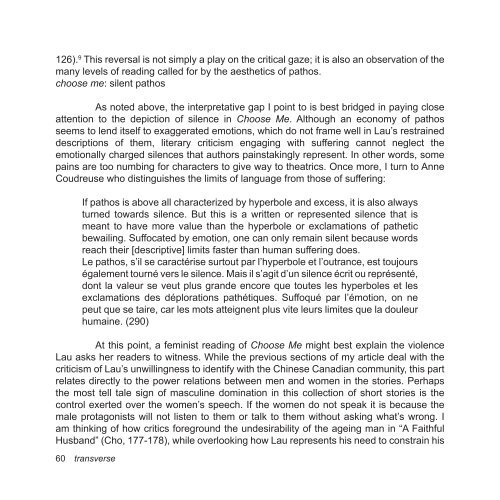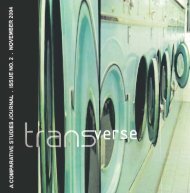Untitled - Centre for Comparative Literature - University of Toronto
Untitled - Centre for Comparative Literature - University of Toronto
Untitled - Centre for Comparative Literature - University of Toronto
Create successful ePaper yourself
Turn your PDF publications into a flip-book with our unique Google optimized e-Paper software.
126). 9 This reversal is not simply a play on the critical gaze; it is also an observation <strong>of</strong> the<br />
many levels <strong>of</strong> reading called <strong>for</strong> by the aesthetics <strong>of</strong> pathos.<br />
choose me: silent pathos<br />
As noted above, the interpretative gap I point to is best bridged in paying close<br />
attention to the depiction <strong>of</strong> silence in Choose Me. Although an economy <strong>of</strong> pathos<br />
seems to lend itself to exaggerated emotions, which do not frame well in Lau’s restrained<br />
descriptions <strong>of</strong> them, literary criticism engaging with suffering cannot neglect the<br />
emotionally charged silences that authors painstakingly represent. In other words, some<br />
pains are too numbing <strong>for</strong> characters to give way to theatrics. Once more, I turn to Anne<br />
Coudreuse who distinguishes the limits <strong>of</strong> language from those <strong>of</strong> suffering:<br />
If pathos is above all characterized by hyperbole and excess, it is also always<br />
turned towards silence. But this is a written or represented silence that is<br />
meant to have more value than the hyperbole or exclamations <strong>of</strong> pathetic<br />
bewailing. Suffocated by emotion, one can only remain silent because words<br />
reach their [descriptive] limits faster than human suffering does.<br />
Le pathos, s’il se caractérise surtout par l’hyperbole et l’outrance, est toujours<br />
également tourné vers le silence. Mais il s’agit d’un silence écrit ou représenté,<br />
dont la valeur se veut plus grande encore que toutes les hyperboles et les<br />
exclamations des déplorations pathétiques. Suffoqué par l’émotion, on ne<br />
peut que se taire, car les mots atteignent plus vite leurs limites que la douleur<br />
humaine. (290)<br />
At this point, a feminist reading <strong>of</strong> Choose Me might best explain the violence<br />
Lau asks her readers to witness. While the previous sections <strong>of</strong> my article deal with the<br />
criticism <strong>of</strong> Lau’s unwillingness to identify with the Chinese Canadian community, this part<br />
relates directly to the power relations between men and women in the stories. Perhaps<br />
the most tell tale sign <strong>of</strong> masculine domination in this collection <strong>of</strong> short stories is the<br />
control exerted over the women’s speech. If the women do not speak it is because the<br />
male protagonists will not listen to them or talk to them without asking what’s wrong. I<br />
am thinking <strong>of</strong> how critics <strong>for</strong>eground the undesirability <strong>of</strong> the ageing man in “A Faithful<br />
Husband” (Cho, 177-178), while overlooking how Lau represents his need to constrain his<br />
60 transverse




